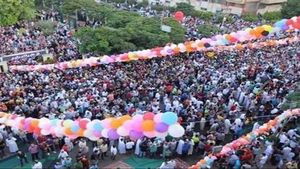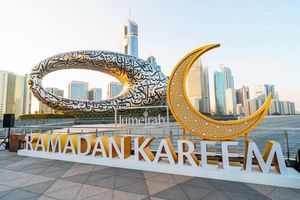Homeland Security Secretary Kristi Noem is poised to make a significant visit to El Salvador on March 26, 2025, focusing on the infamous Terrorism Confinement Center.
This facility has garnered attention due to its role in housing Venezuelans, particularly members of the Tren de Aragua gang, whose deportation from the U.S. has sparked legal battles.
As part of her trip, Noem plans to meet with El Salvador's President Nayib Bukele, showcasing a collaborative effort to strengthen immigration policies.
Noem remarked, "This week, I'm headed down to El Salvador. I'll be in the prison where we sent [Tren De Aragua] gang members. I'll be meeting with the president and also Colombia and Mexico, talking about building these relationships so we can continue to get people out of this country that don't belong here and take them home." This statement emphasizes her administration's proactive approach in addressing illegal immigration.
The main context of Noem's visit is the Trump administration's ongoing campaign to curb illegal immigration, which has seen significant advertising expenditures. Noem's Department of Homeland Security (DHS) has launched a $200 million public outreach campaign aimed at warning individuals against attempting to enter the United States illegally.
Noem stressed the campaign's message, stating, "They shouldn't be coming here illegally. So we are in several other countries around the world with a message right now that's saying if you are thinking about coming to America illegally, don't do it — you are not welcome. We have a legal process to become a United States citizen, and there are consequences if you come here illegally."
The background of the situation highlights the complexities of various deportation cases. Earlier in March, a federal judge imposed a temporary order against deporting Venezuelans just as flights were already airborne. The Trump administration contended that only written directives were binding, not verbal ones, further complicating the legal landscape.
White House Press Secretary Karoline Leavitt noted, "about 261 people were deported on the flights, including 137 under the Alien Enemies Act." This historical invocation of the Alien Enemies Act of 1798 provides the Trump administration with considerable latitude to deport non-citizens without due process.
Notably, the conditions within the Terrorism Confinement Center also raise eyebrows. Opened by Bukele in 2023, the prison houses criminals who are accused of serious offenses. Featuring eight pavilions with maximal capacity for up to 40,000 inmates, each cell is crammed to hold as many as 65 to 70 prisoners, with no opportunities for recreation or educational programs. It effectively operates as a high-security facility stripped of many rights typically afforded to prisoners.
El Salvador's lack of diplomatic relations with Venezuela since 2019 presents additional complications for the imprisoned Venezuelans. They currently lack any consular support from their own government.
On March 24, 2025, lawyers representing the Venezuelan government filed habeas corpus petitions in a bid to secure the release of their citizens. With the country under a state of emergency, the judicial system has faced considerable limitations, leading to wrongful detentions. Over 84,000 individuals have been arrested since punitive measures began.
The ongoing negotiations around these deportations and the harsh prison conditions come at a time when the Trump administration intensifies its focus on enforcing stricter immigration protocols. During her visit, Noem is also expected to meet leaders from Colombia and Mexico, underscoring the broader implications of immigration on a regional scale.
Assistant Homeland Security Secretary of Public Affairs Tricia McLaughlin commented, "This trip underscores the importance of our partner countries to help remove violent criminal illegal aliens from the United States." This encapsulates a growing sentiment in U.S. immigration policy discussions, framing the situation as part of a broader strategy against gang-related crime.
Noem's visit to the prison stands to spotlight the ongoing intricacies of immigration policy between the U.S. and Latin America, as well as highlight the challenges faced by deportees. As she engages with Bukele and other leaders, the focus on reinforcing the U.S. stance against illegal immigration will undoubtedly shape how future policies are crafted.





